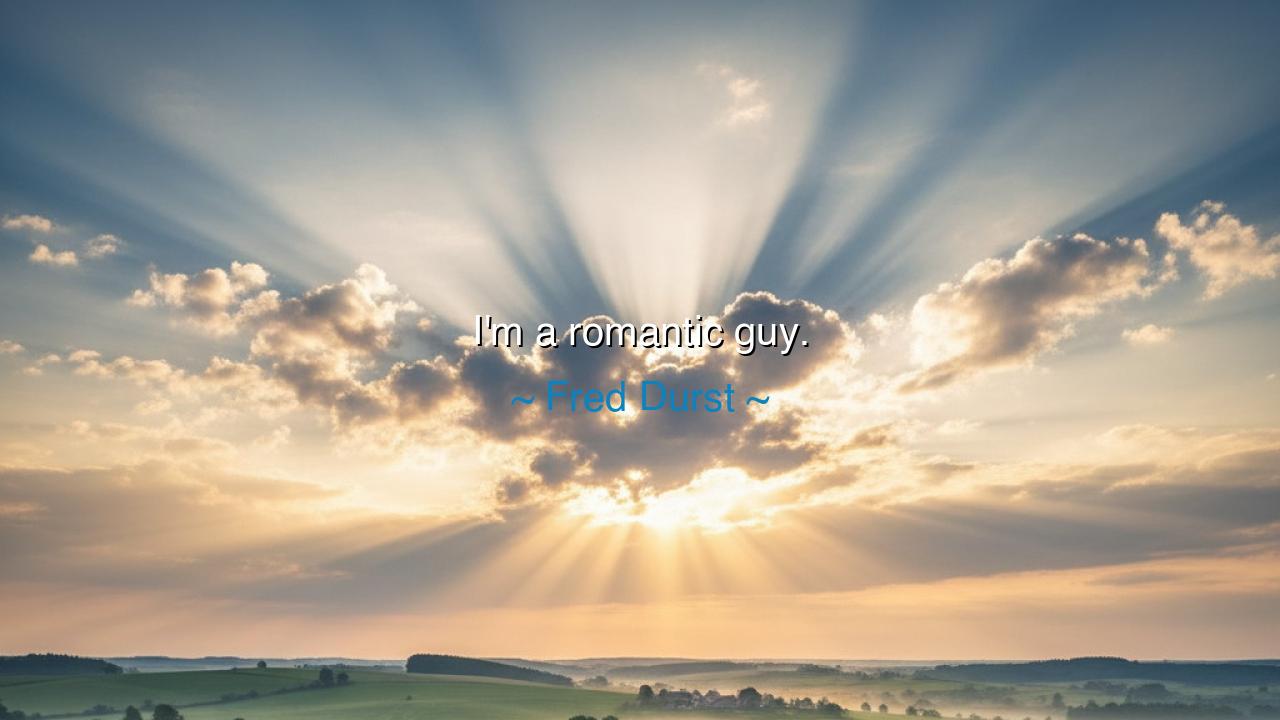
I'm a romantic guy.






Hear the simple yet striking words of Fred Durst: “I’m a romantic guy.” To the untrained ear, these words may sound casual, perhaps even offhand. Yet within their simplicity lies a powerful confession: that beneath the armor of toughness, rebellion, and bravado, there beats the tender heart of a man who longs for love, connection, and beauty. For to declare oneself romantic is not a boast of conquest, but an admission of vulnerability. It is to say, I seek not only power or fame, but the intimacy of the soul.
Durst, known for his fire on stage and his defiance as the voice of Limp Bizkit, stood often as a symbol of rage, rebellion, and raw energy. And yet, in uttering these words, he revealed another truth: that even the fiercest warrior longs for tenderness. This duality is ancient. The same hand that wields the sword must sometimes write the poem. The same voice that roars against the world must sometimes whisper in the quiet of love. Thus, Durst’s confession places him in the lineage of those who lived with contradiction: powerful in the world, yet humble in the heart.
History is filled with men who were both fighters and romantics. Consider Napoleon Bonaparte, conqueror of Europe, feared across nations. Yet he wrote letters to Josephine filled with longing, tenderness, and devotion, words that reveal the depths of his vulnerability. So too with Fred Durst: behind the noise of his music and the storms of his persona, there dwells a man unashamed to say that love moves him, that romance guides him. Such honesty is not weakness, but strength—the courage to reveal softness where the world expects only steel.
To be a romantic guy is to see beauty where others pass it by. It is to believe that love can still heal, that kindness is not wasted, that a gesture—a letter, a touch, a word—can mean more than all the riches of the earth. Durst’s words remind us that romance is not confined to candlelight and roses; it is a way of seeing the world, of treasuring connection, of believing that intimacy matters more than pride. To live romantically is to live with the heart awake.
But let us not mistake romance for mere softness. The romantic spirit is also heroic. It is what drives the soldier to fight not only for glory, but for home. It is what moves the artist to paint not only for acclaim, but for love of beauty. It is what inspires the lover to remain faithful when temptation whispers. The romantic does not surrender to cynicism, even when the world sneers. Instead, he holds fast to the flame of devotion, declaring: I still believe.
The lesson here is clear: do not bury your romantic self beneath masks of toughness or indifference. The world may tell you that strength means hardness, that vulnerability is weakness, but this is a lie. True strength is the courage to love openly, to cherish deeply, to care when it would be easier not to. When you say, “I am a romantic,” you affirm that love is not an accident of life—it is its very meaning.
Therefore, children of tomorrow, embrace your own romance. Write the letter, speak the kind word, give the gift of presence. Do not fear to look tender even in a world that worships hardness. Let your life be both a battle and a song, both fierce and gentle, both storm and light. For to live as Fred Durst confesses—to be a romantic guy—is to live fully, with the heart unashamed and the soul unbroken.
And so his simple words, stripped of ornament, carry timeless wisdom: in the end, it is not the noise of the world that endures, but the love we dared to give.






AAdministratorAdministrator
Welcome, honored guests. Please leave a comment, we will respond soon